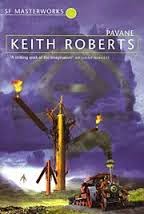A review of Pavane, by Keith Roberts
This is one of the “SF Masterworks” series which has re-issued, over the decades, some absolutely classic titles. Some of them are well-known to me; others, like this one, I had never heard of. You can see the list yourself here. I’ve read 21 of the 73 titles in the softcover list. It is necessarily some editor’s subjective choice, and there is a tendency for Philip K. Dick to appear rather too often in my view.

But this is about Pavane. A pavane, we read, is a kind of Latin dance. This is important. Roberts has written a work with six “measures”; six long chapters, each of them meaningful, each of them drawing us onto an inevitable conclusion. We start in the late 1960’s, and we finish sometime near the end of the 20th century, describing the growth of, the antecedents of, a very English revolution. A humble engine-driver at the beginning, further on has become a rich business man. His niece becomes the mother of a firebrand aristocrat, the Lady of Corfe, whose actions bring the established order down in flames and ruin. Throughout, there is an older hidden England, a faerie England, at work. It is at work for good. It is a concealed spiritual England such as C.S Lewis hints at “That Hideous Strength” – although he speaks rather, of “Logres”, a spiritual Britain.
Pavane is an alternative history. And it is remarkable as such, for it is a work of writing craftsmanship, a finely shaped bow or arc of story from beginning to end. In this alternative history, Good Queen Bess is assassinated in 1588; the Spanish Armada is successful in its conquest of England, and the entire Reformation is brought to a bloody halt, unlikely as it may seem (more on that in a minute.) The Catholic church militant then reigns from Rome, supreme and unchallenged, for centuries down to modern times.
The story starts in the late 1960’s in Dorset. Part of the attraction of the novel for me was the writer’s clear love of and knowledge of Dorset, an area I know and love myself. Most of the action is set between Dorchester and the Isle of Purbeck.
We see how control of innovation can prevent progress: in this alternate 1960’s, steam traction engines haul goods along rough unmade roads, often threatened by bandits in the woods, and subject to the constraints of impending darkness and winter weather. The use of concrete is tightly controlled and even banned – because concrete can be used to create fortifications, and hence foster rebellion against Rome, which is ruthlessly put down by the Church Militant.
There is no electricity; there is no radio or TV. Petrol and diesel engines have been invented, but the church has circumscribed the use of these new-fangled devices by Papal Decree. But in this world, unthinkable rebellion is brewing slowly, in the woods, in the fields, in the quiet villages. It is a world where the strength of England is found in the countryside.
Writing as a believing Christian here, I sense that Keith Roberts perhaps has little time for church or religion – but he never becomes openly anti-Christian, as in the worldview seen in such work as the “His dark materials” trilogy of Philip Pullman. He writes with a light pen of the faeries, the “old people”, of the old religions and the older Gods – Wotan, Thor, Freyr. In this he prefigures – or at least reminds me of – the much later work of Neil Gaiman in his excellent “American Gods”.
Pavane was very readable, very engaging, and full of delightful and evocative language. If I had a criticism of it, it would be of the opening premise – that the assassination of Queen Elizabeth I, and even victory for the Spanish Armada, would have been enough to destroy the Reformation and the protestant energy and faith of north-western Europe.
I’d argue not. I’d argue for a historical inertia; doubtless there are “cusp” points in human history when much can change subsequently because of a single event. But I’d argue that there are far fewer of them than science-fiction authors might like. I’d suggest the assassination of JFK might have been one; I’d certainly argue that the death from disease of Prince Arthur, allowing his younger brother Henry to become Henry VIII, was another.
But I think, rather, that there is a kind of historical inertia. I don’t think it’s quite so easy to change history through the turn of a card or the flap of a butterfly’s wing. I’d suggest that there is considerable cultural and historical momentum, which is preserved and not lightly shifted. Consider: throughout history there have been many times when reactionary forces might have won on the battlefield, but didn’t – would it have made much long-term difference even if they had?
Realistically would England be that different now if Charles I had won in the English Civil War? Would America today be really that different if the thirteen colonies had failed to prevail in their Revolution? And even if the South had won on the battlefield in the American Civil War, as a slave economy competing in a free market it could never have prevailed against the North in the long term. When the conservative, the reactionary and the traditional meets the progressive, the proactive, and the forward-looking, in the long run, there can be no doubt about what the outcome will be. The status quo is never acceptable.

Pingback: Fifty-one in 22 – reading this year | Plateroom 28